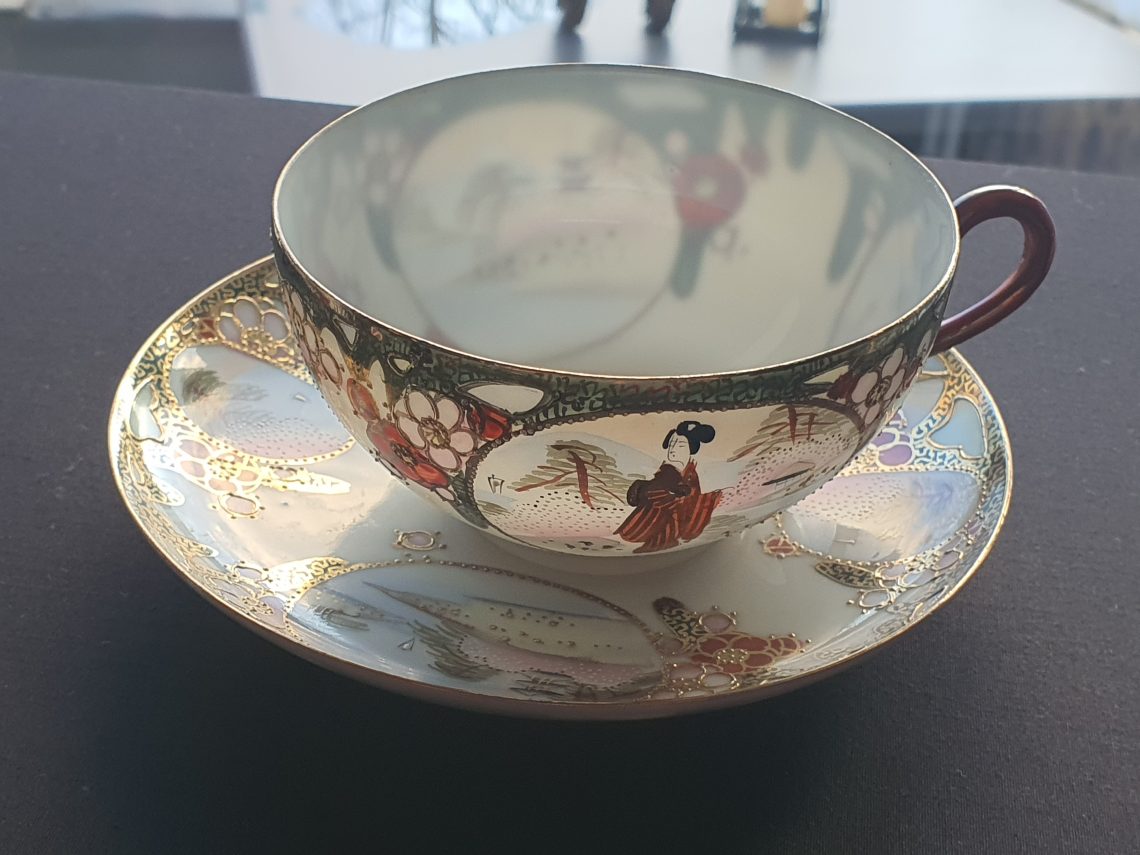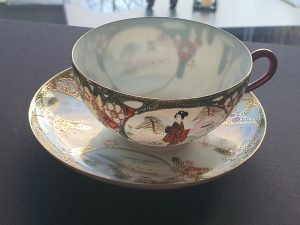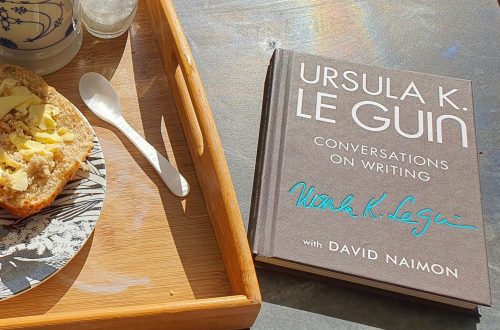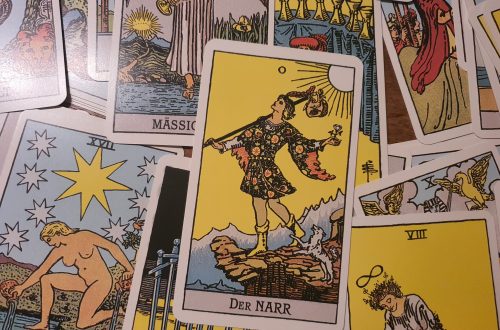
From the House of Prompts: The China-Woman
At writing workshops, tutors often use every day items or photographs as a writing prompt. It always amazes me what complex stories people can spin from the simplest things. When I come home for Christmas, I often feel as if I am entering the House of Prompts. My parents’ house is full of things that were inherited from my grandparents, that belonged to my father or that were a gift from someone we once knew. There is an emotional connection, a story how they entered this house, but usually no one to ask for a full account. Inevitably, we build their stories according to our own memories – and imagination – without always being able to tell the difference. We need to place them somewhere into our emotional universe. We need to – or we get to. Get to place them so that our stories can come full circle.
Last night, we closed the Christmas celebrations with a cup of tea, and my mother chose a porcelain set we rarely use. It is made in China and the porcelain is so thin that even the light of a winter’s day can cut through it. As if it might break as soon as you touch it, which is why it is locked away most of the year.

On the light white of the porcelain, the hand-painted red and golden décor feels rough and heavy. Nowadays, everything is from China and the motifs look familiar, but this one is different. My grandmother got it from her mother, one of the few things she brought into the marriage that was truly hers. My great-grandmother herself must have bought it around 1920, this is at least our guess, probably from a sales kontor in Leipzig. But how and why this came into her possession is a total mystery. In the 1920s, such a treasure from the Far East might have been owned by a middle-class family in Hamburg or Berlin. But my great-grandmother lived in a tiny village in Saxony. After World War I, the people there had other things to do than gathering exotic eccentricities. Money was spent either on warm clothes or on equipping a future household. White linen tablecloth, silver cutlery, Meissner porcelain. Those were the luxury items of her kind.
What drove this young woman to invest the few funds she must have had into such an exquisite and fragile thing? From a place she had never seen and would never see. In a design, that was unlikely to be fashionable in her circles. Was this a way to impress neighbors and friends, to come across as nouveau-riche? Being employed at “Deutsche Bahn” for the local train station, her own father was only one step ahead of the farmers and peasants. Maybe serving tea in these lighter than air cup was supposed to broaden the gap? Did they mock her, call her the China-Woman behind her back?
Or she was not the one to care about tea circles and all the village talk. Perhaps she was a truly free spirit, one of those that are left unharmed and uncontained, no matter how narrow-minded and downsizing their environment. And when the tea set caught her eyes, on a short day trip to Leipzig, it may have answered her deep longing for a different world, or at least a different kind of beauty than the one she was surrounded with.
As now I get to choose, I choose the latter. We’ll never know because my great-grandmother died from cancer when my grandmother was a little girl of eight years. We do not even have a picture of her, all I know is that she was born in the same village where she died and had never lived anywhere else. I hold the cup in my hand, and I somehow think she must have been a fine, beautiful woman.
But I knew my grandmother, my paternal grandparents lived a few houses down the road. I never heard anybody call her a free-spirited woman. She was never into travelling, she refused to get a driver’s license even after women were allowed to drive in Germany. She was not into arts, not that I knew. My father used to say, she had the abonnement for the opera only to show off her latest fur coat. She was into gossip and eating cake and as for her other skills, she made it an effort to not parade them much.
But inside that woman, that life had not treated kindly, there was a vulnerable, sensitive soul. She could still remember the way her mother’s perfume had smelled or how soft the fur of her pet bunny had been, and she could describe it to me so that I could smell and feel it too. And her eyes would get watery, as if it was not seven decades ago that she had last seen either. When I look at those few black and white photos we have from her and her father and other relatives in their Sunday clothes, I look in their stern faces, and it is as if one can read the simple truths they lived by in their eyes. The hardships and the few earthly pleasures they had to feast on. Being sentimental was not part of the deal. And I could never imagine my grandmother standing among them.
Nonetheless, she glorified her childhood and the place where she was born. The separation between East and West Germany made it seem like a paradise lost. But when these long-lost relatives finally came for a visit, after the wall came down in the 90’s, the reunion was lacking emotion and the contact soon dwindled again. The one story I heard about my grandmother, over and over, is the story of her wedding dress. She got married to my grandfather on January 23rd, 1940, the war had dictated the wedding date. The sensible thing would have been to wear a woolen dress and a thick coat. But she was unwilling to give up on her princess day, she insisted on the long white dress with a low back and a lot of lace, to look splendid on the pictures. And of course, she fell terribly sick. She almost died from pneumonia while my grandfather had to return to his regiment. The story was used by the men of my family as an example of how foolish and irresponsible women are.
And foolish and irresponsible it was. But maybe it was more than an act of flattery or vanity. Maybe it was an expression of a deep yearning for a more glamorous, a more enchanted life where wishes were granted generously. Insisted on at the wrong moment, yes, but she was still so young. And holding this cup into the December light, I think it might have been her mother, the mysterious China woman, who had instilled this yearning in her.
My grandmother held on to these fragile cups when she left her hometown to follow her husband to West Germany. She had to leave some of the white linen and silver cutlery behind for their sake. And by doing so, the story of the China woman is still with us. It shapes us while we shape it, because this is what stories do.





2 Comments
Christina
So beautiful! It was lovely hearing you read it Saturday night.
Ella Voss
Thanks Christina 🙂